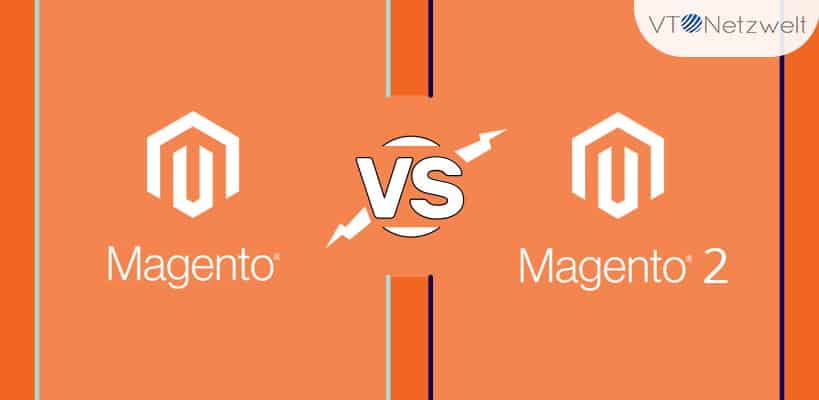Summary of the Article
Have a project in mind?
Schedule a CallMagento 2 vs Magento 1 – Is the upgrade worth it?
Summary of the Article
Magento 2.0 was released in November 2015, after four years of development, aiming to replace the 1.x version of the eCommerce platform. It was the transformed version of Magento, which comes with a brand new coding structure, architecture, and database design.
Back on February 12, 2017, Ben Marks, Evangelist at Magento tweeted about the official date of Magento 1 sunset that was November 2018. This news was confirmed by Paul Boisvert, head of product management at Magento, and verified Novembre 18, 2018, as the exact date of an official goodbye to Magento 1. Three years of the end of life warning was given to the store owners. Later it was said by Magento Inc. that right now, there is no plan of discontinuation for Magento 1.
The new version of the Magento 2 platform was released simultaneously for the Enterprise and the Community Edition. New features and functionality were introduced within the paid and the free eCommerce solution provided by Magento. Magento 2 supports the latest PHP, which helps in improving the overall speed of a site. Cleaner coding, user-friendly dashboard, and meta tag functions are also offered by Magento 2.
It is essential to plan for Magento migration, and the best minds are already focused on migrating to Magento 2. It is crucial to decide if you really need to migrate your web store from Magento 1 to Magento 2, and this decision shouldn’t be taken in a hurry.
Since Magento Community Edition (Magento CE) is free to download, it is up to you to decide whether to upgrade to the latest 2.x version and how. Those holding licenses for Magento Enterprise Edition 1.x (Magento EE) can extend their licenses for the current version of the software but must upgrade to Magento 2 before July 2020.
Hence, like it or not, merchants using Magento 1 will be forced to upgrade to Magento 2 or migrate to another eCommerce platform as Magento 1 end of life is approaching. By that date, the 1.x versions of the community edition will be so archaic that they will require a virtually mandatory upgrade as well.
Why do you need to migrate before sunset of Magento 1?
- There is a risk of a data breach if you fail to migrate until June 1, 2020. Magento 1 web stores will be a security target, and there is a high risk of brand reputation loss, which will leave long-lasting adverse effects.
- A fine of 10000 to 25000 EUR per month can be implemented by card scheme due to security patches in the payment process. Also, you may not be compliant with PCI DSS (Payment Card Industry Data Security Standards).
Is the upgrade worth it? It depends on many factors, such as the technical requirements to implement the new version and the total cost of ownership.
Furthermore, you should check whether you could take complete advantage of the new key features, which you are paying for. Magento 2 is faster than Magento 1 as it offers faster end-to-end checkout times, faster page load speed, and faster add-to-cart server response times.
System requirements
Let’s take a look at the system requirements. Magento 1 is running on Linux x86 and x86-64, while Magento 2 can be deployed only on the newer Linux x86-64. This means your organization or hosting provider will have to switch completely to Linux x86-64 in the near future.
It is hard to tell whether this is bad or good news in the short-run, and it all depends on your existing server environment or the software infrastructure of your hosting provider.
Both versions require Apache or Nginx web server, with Magento 2 supporting the most recent version of the software. Magento 1 needs PHP 5.4 or 5.5, while Magento 2 supports PHP 5.6x or higher versions to run. Magento 2 can take advantage of the new features provided by the PHP 7.0.2 version.
A notable improvement in Magento 2 is the integration of new technologies like HTML 5, CSS 3, support for PHP 7, and Apache 2.2. That said, Magento 2 naturally integrates the latest frameworks, which, in theory, should boost speed and provide better customer experience through improved technology.
Magento 1 requires MySQL 5.6 (Oracle or Percona) database, while the new versions support MySQL 5.6.x. Magento 2.0 to 2.3.4 is able to use three master databases, providing scalability of key areas such as order management, product management, and Checkout, which in turn results in better performance.
This is a notable improvement towards better scalability but is not a factor you should consider if you already run a stable software environment and do not plan aggressive expansion in the near future.
Security
The latest update of Magento 2 in Magento 2.3.4, which includes more than 30 enhanced security updates and 220 functional fixes of the core product. The security improvements help in closing the vulnerabilities caused by remote code execution and cross-site scripting.
The latest Magento version provides authentic administrative control, which protects the customer information. Many appropriate actions were advised, such as two-factor authentication, IP whitelisting, VPN, and strong passwords, to protect administrative access from any type of attacker.
For security purposes, Magento has conducted some fixes to core codes. Removal of layout updates and custom layout updates was important to remove remote code execution.
Architecture
The store performance is improved significantly in Magento 2. By adding various technologies like Composer, Apache, Symfony, Nginx 1.7 or higher, the stack is transformed incredibly.
Key architecture improvements are, native supports HTML/CSS3, in-site PayPal experience, data grid for catalog, advanced content staging, elastic stretch, integrated video (PDP), and many more.
Due to minimized and bundled JavaScript, there is a reduction in unnecessary browser operations on the client-side. Also, the advanced browser caching for static content is a notable difference.
The three major updates to enhance website security in the platform are:
- RabbitMQ V3.8 is the latest released version of 3rd party technology, which is used by an upgraded version of Magento 2 to enhance the message queue framework.
- The session storage and caching capabilities are improved as per the tests conducted on the latest version of Redis V5.0.6.
- The support to use declarative schema with MariaDB 10.2 and MySQL is improved by Magento.
Other than security enhancement, there is an improvement in infrastructure, merchant tools, inventory management, and GraphQL.
Enhanced performance and speed
Magento 2 offers major improvements in the administrative user interface, which now allows merchants to access their online stores using responsive navigation through devices based on touch technology. The import and export of products were improved to support cross-sales and upselling.
A step-by-step product creation tools enable faster creation of configurable products bypassing the manual creation of a simple product required in the earlier Magento versions. Drag-and-drop administrative tools are another notable improvement, especially compared to the quiet unintuitive UI of the older versions.
Another key improvement is the checkout process that now requires only two steps, compared to the 5-step process in the older version. The overall experience was also improved through one-click account creation and auto-recognition of registered clients.
A 5-step checkout in the older version is definitely something you should be worrying about since most eCommerce platforms already provide functionality for a 2-step or 3-step checkout. The majority of marketing experts are of the opinion that a 2-step checkout and guest checkout markedly improve conversion rates.
The new Magento edition supports full page caching through the Varnish web accelerator, providing faster page loading time. It also provides new built-in responsive themes for faster store creation.
Well, page and site caching are also offered at the level of your hosting, but faster website loading matters nowadays. One should also welcome a new functionality for better compression of images and faster loading of JavaScript in content-rich stores. This will result in better performance of Magento 2-based merchants.
Customization and extensions
Magento 2 also provides support for Composer, a PHP dependency manager, to manage dependencies when developing extensions or tweaking the codebase. This new feature should help your developers in the implementation of flawless customizations to your store, which is a good thing.
Although not exactly a feature, the Magento commitment to quarterly updates of the platform should be considered a major improvement. Furthermore, Magento Connect was reorganized into Magento Marketplace, where all extensions to the eCommerce platform are assessed by the team of Magento.
It is not a money-back guarantee but introduces a new level of reliability for both free and paid third-party extensions. The new technology introduced in Magento 2 makes the process of modification of functionality and installation of extensions more natural.
Dashboard and SEO comparison
Magento 2 admin panel is interactive and person-friendly. The easy navigation system helps in finding information quickly and manages your store successfully.
The comprehensive dashboard indicates common orders, revenue tax, top seek elements, final orders, lifetime sales, and many more capabilities.
On the contrary, the layout of Magento 1 is quite messy, which states that Magento 2 is better than Magento 1. The duplicate content problems are not there in Magento 2 due to the great feature of Canonical tags.
Magento 2 enables meta title, meta description, and meta keywords for men and women pages.
Migration to Magento 2.x
A data migration tool is available for Magento CE, and Magento EE, and, reportedly, the transfer of stored data is working seamlessly in both editions of the platform.
Magento 2 does not allow for direct migration of Magento 1.x themes, both within the community and the enterprise edition. Nonetheless, Magento license holders can take advantage of new built-in themes while Magento provides extended support for theme migration.
Most Magento 1 extensions are not compatible with Magento 2, but upgraded versions are available for purchase or download via the Magento Marketplace.
This applies to both Magento CE and Magento EE. There is a good chance the extensions updated to run on Magento 2 will be more stable and reliable after the introduction of Magento Marketplace with its stricter supervision.
Most custom code implemented in Magento 1 can be migrated into Magento 2, but some custom-made extensions might require significant re-coding to run on Magento 2.
This could be a pain if you have invested heavily in custom development under Magento 1 but should upgrade to Magento 2.
Conclusion
Most IT consultants agree that if you are running a Magento version 1.8 or later, you can safely stick to your current solution for the foreseeable future. Especially, if you did not plan to upgrade to a later version due to technicalities or because a particular feature is missing in your current version.
Provided that you hold a license for a relatively recent version of Magento 1, you can afford to wait and see whether the new Magento pricing model will be successful enough to last or the company will be forced to lower the prices of its paid products.
Plus, you could explore the options offered by Magento Enterprise Cloud Edition, which is a platform-as-a-service (PaaS) solution. Some industry analysts expect the cloud solution to be priced north of Magento EE, but a working pricing model is yet to be established and tested.
In theory, the upgrade to Magento 2 is worthwhile bearing in mind the enhanced shopping, customer experience, and customer retention features incorporated into the platform. Improved ease-of-use and faster page load are other factors to consider.
Both the community and the enterprise editions are worth upgrading in the light of fierce competition between the eCommerce platforms, where new features and greater speed can be decisive success factors for an online store.
Some Magento competitors are gaining momentum. Therefore, Magento could be forced to downgrade their pricing, especially within the framework of an increasingly competitive market.
| Pros | Cons | |
|---|---|---|
| System requirements | Supports the latest software | Additional software upgrades required |
| Features |
|
None |
| Cost |
|
|
| Migration |
|
|
Hire our experts for a seamless Magento 2 migration
It’s high time for you to migrate to Magento 2. Partner with us for an easy and seamless Magento 2 migration with zero headaches.
We have successfully migrated 100+ Magento stores. Magento 2 migration offers –
- Faster loading
- Streamlined checkout
- Intuitive admin interface
- Page caching
- Better dependency management
- Better efficiency, and many more.
The leading Magento development company, VT Netzwelt is offering a free 2-hour Magento 2 migration assessment to offer seamless Magento 2 migration.
Contact us now and request a free Magento 2 migration assessment.










